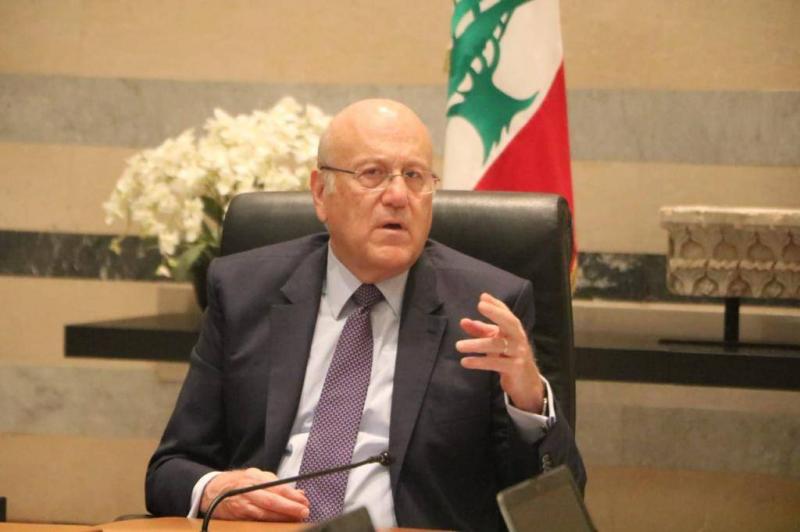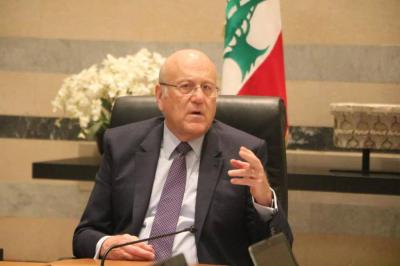The outgoing Prime Minister, Najib Miqati, pointed out that "after attending today's parliamentary session and the inability to hold the legislative session, I mentioned that some declare they only attend the parliament for urgent legislation, while I believe there is no greater urgency at the moment than a meeting of the parliament to discuss all proposals and bills related to the economic recovery plan, the restructuring of banks, the financial gap, and the issue of capital control, as mentioned in the bill sent by the government."
During the Cabinet session today, Thursday, he stated, "What we see is that the parliament does not meet and the government is facing attacks at a time when the country has reached an extremely difficult and dangerous stage," noting that responsibility does not rest solely with the government, as they are doing much more than just managing affairs, because the continuity of the country and its institutions matters to them.
He affirmed that "our meetings are ongoing to ensure the continuity of institutions; however, in the end, it has been nearly a year since the government has been in caretaker mode, which was not expected. We have begun to exhaust our resources and are entering a very difficult phase. During my meeting today with President Nabih Berri, I drew his attention to the impossibility of continuing in this manner. Unfortunately, we found ourselves in a caretaker phase at a time when we had a vision for the future and how to revive Lebanon."
He expressed regret that parliamentary sessions are not convening, recalling that during the crisis in Greece, the parliament remained in session for three days to pass all required laws. "Greece is now back to its recovery," he noted.
He pointed out that "in contrast, our crisis has lasted four years, and no financial reform bill has been approved yet. More importantly, the extreme danger lies in the fact that, in the absence of a law for the restructuring of banks and resuming their normal activities, we are now relying on a cash economy, which poses a significant risk as it is a means for all financial crimes that may occur. I fear that if we delay further in the approval of laws, the consequences could be very severe—not just for individuals, but for the economy of the country as a whole."
He stressed that "if the parliament does not hurry to pass these laws, it will become impossible to operate after we have exhausted all means to keep the country standing. We cannot continue to shoulder the responsibility alone; everyone must cooperate to elect a new president or, at the very least, collaborate to convene the parliament and pass essential laws; otherwise, there will come a day when I inform you that a fundamental and sensitive decision must be made regarding our continuity in the work we are doing."
He concluded: "In facing this bleak outlook, there is an optimistic perspective regarding the upcoming oil exploration in the south, and next week we will visit this platform. We were promised that before the end of the year we could start receiving indicators about the existence of oil and gas, noting that all indications suggest their presence."
### Decisions
After the session ended, the Minister of Information in the caretaker government, Ziad Makari, announced that the Cabinet approved the topics listed on its agenda, including the approval of the recruitment and appointment of cadets in security agencies and the approval of a memorandum attached to the agreements signed between the Lebanese government and the UN High Commissioner for Refugees regarding the delivery of personal data related to Syrian refugees in Lebanon.
In response to a question about the electricity file, he said, "The matter is being resolved according to a mechanism that calls for a monthly payment of seven million dollars, in cooperation with the Central Bank and the Ministry of Finance."
### Advance of 5,000 Billion Lira
Following the Cabinet session, the Minister of Education in the caretaker government, Abbas Halabi, indicated that "to ensure a safe return for teachers and enable them to go to schools, we requested, in addition to the allocated salaries, which could be considered for the 2024 budget, to allocate incentives in US dollars to teachers, with an estimated cost for this year of around 150 million dollars, a calculated figure that covers incentives and health costs to some extent, as well as funding for school and vocational education funds."
He stated: "If this amount is not paid as an investment to ensure the continuity of the academic and university year, the resulting loss, according to a World Bank report, would be nearly two billion eight hundred million US dollars due to students not returning to schools and universities."
He announced that "the Cabinet approved an advance of 5,000 billion Lira as the first installment of the requested amount of 150 million dollars to ensure the commencement of the school year." He noted that "just as funds are secured for other facilities, funds must be secured for the Ministry of Education."
He said: "Regarding the regularization of contracted professors at the Lebanese University, the Cabinet has empowered the Minister of Education to collaborate with the university administration to prepare the necessary decrees, with attention to maintaining relationships with donor entities," confirming the necessity of regularizing this relationship.
Regarding the Lebanese University, he pointed out that there are multiple subjects: "First, the budget requested by the university should not be less than 4,800 billion Lira, and there is also the matter of contracting hourly professors to become permanent in the university, and the Cabinet authorized the Minister of Education to cooperate with the university to prepare and set the necessary decrees, albeit not all at once but gradually."
On the subject of education for non-Lebanese, he stated, "The problems arising from our relations with donor entities and our requests to them to increase the amount per student because they do not allocate more than 140 dollars per child in Lebanon, while they provide around 600 dollars in Jordan and Syria. I presented this to the Cabinet; this is the government's policy, and we must use it to renegotiate with donor entities to equalize non-Lebanese students in Lebanese schools with what is happening in Jordan and Turkey, as even the rights provided by donor entities to the Ministry of Education in this regard are not regular in terms of payment."
### Himiya
As for the Minister of Public Works in the caretaker government, Ali Himiya, he pointed out that the airport has been operating since yesterday using four generators, and the port is using five generators. He said: "We realized from the beginning the existing situation in the public treasury and the electricity status in the country, and we prepared emergency plans. It is the responsibility of the relevant parties in the Ministry of Energy and the Electricité du Liban to pay operators according to legal procedures and to understand that public facilities such as the Beirut airport and port are red lines that should not be deprived of electricity for even one minute."
He added: "There is no shortage of fuel, and this matter should be outside any negotiation or discussion between any operator or any concerned institution in the Lebanese state."
He noted: "We presented the reality of the airport and maritime ports, and our revenues in the Ministry of Public Works and Transport amount to millions of dollars going directly to the public treasury. The Lebanese people should know that we cannot spend any dollar; all collected revenue goes to the treasury, totaling around 400 million dollars. Therefore, we demanded today funds for rainwater and snow drainage files, road clearance, road maintenance, bridge expansion joints, and numerous other issues. We were promised there will be an item on next week's Cabinet agenda to discuss this matter and ways to secure funds from the public treasury. We have reached a kind of solutions regarding rainwater drainage contracts with operators and contractors."
### Ministry of Labor
For his part, the Minister of Labor in the caretaker government, Mustafa Bayram, emphasized that "we requested Total and the contracting companies to prioritize the employment of Lebanese youth." He affirmed that "the Ministry of Labor is the sole entity still generating revenue for social security and keeping it alive."




